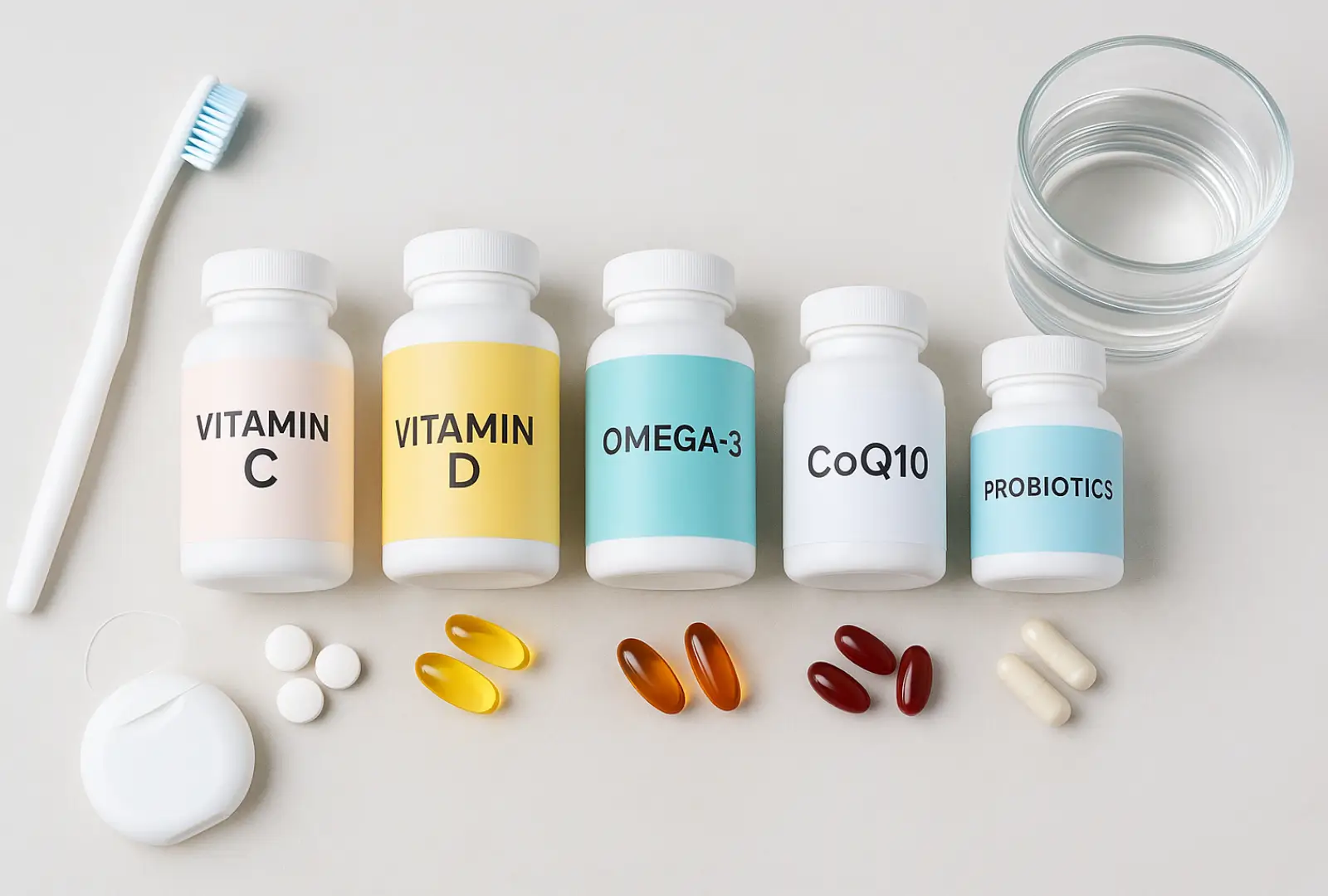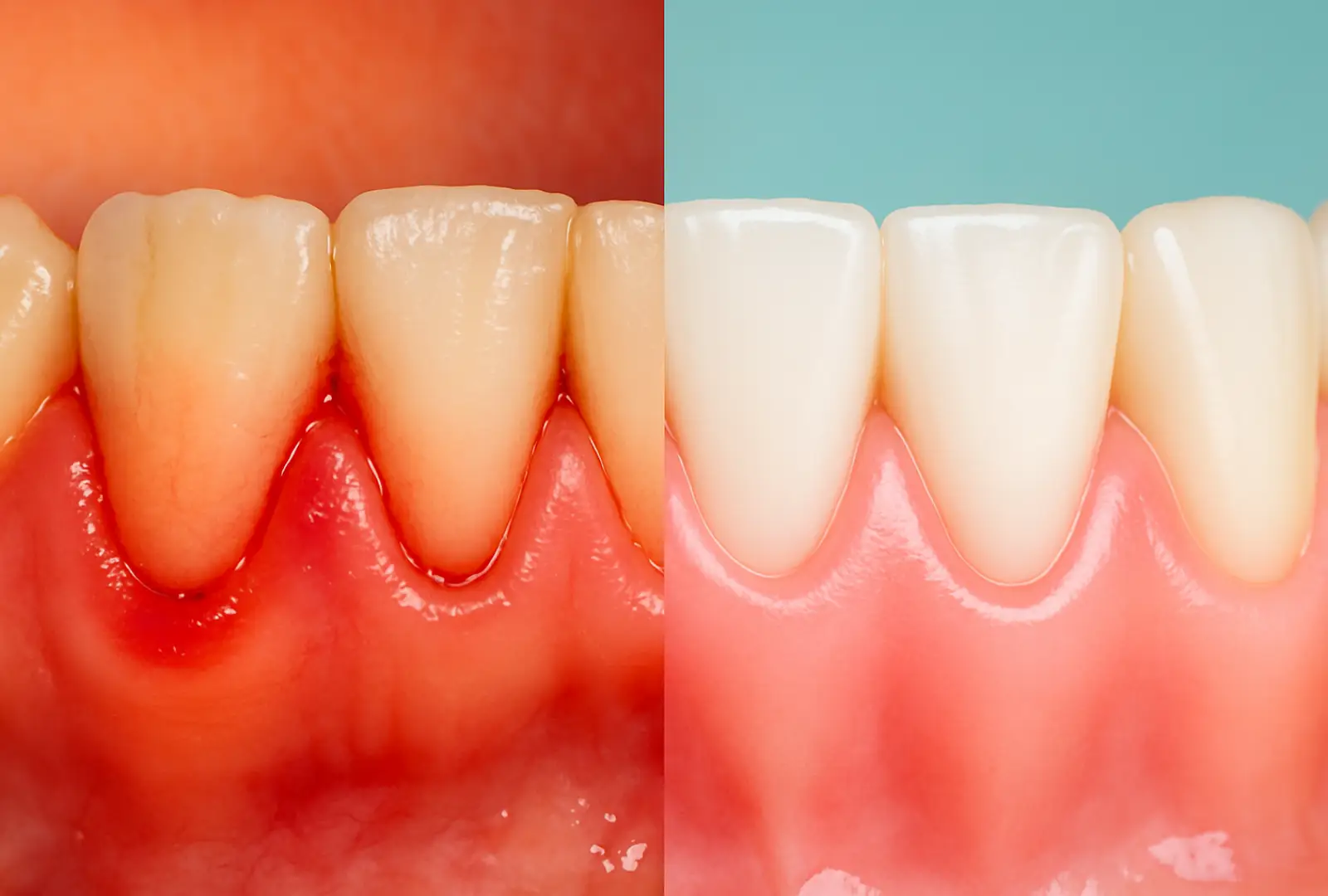Are your gums bleeding when you brush? Are they swollen, tender, or painful? These are just a few signs that your gums may need extra care. In fact, many people experience some form of gum issues, and it’s more common than you might think. One of the most effective ways to support your gums and keep them healthy is by incorporating specific vitamins for gum health into your routine.
According to research, 42.2% of adults aged 30 years or older have some form of periodontitis, with 7.8% experiencing severe periodontitis. The prevalence increases with age, with about 60% of Americans aged 65 and older affected by moderate to severe periodontal disease.
Vitamins for gum health play an essential role in maintaining gum health and can help prevent gum disease. But with so many options available, how do you know which supplements are best for your gums? In this article, we’ll dive into the top 10 vitamins for gum health, how they can help, and which supplements you should consider adding to your daily regimen to keep your gums in top shape.
So, let’s get started!
| Key Takeaways Bleeding, swollen, and painful gums are common signs that your gums may need extra care, and incorporating vitamins for gum health can significantly help improve your gum condition. Vitamin C is crucial for gum health, supporting collagen production that is necessary for gum tissue repair, and a deficiency in this vitamin can lead to gum disease and tooth loss. Omega-3 fatty acids reduce inflammation and help prevent gum disease, offering significant benefits for gum health by targeting the root causes of gum inflammation. Vitamin D plays a vital role in calcium absorption, which is necessary for strong teeth and gums, and its deficiency can contribute to gum disease and tooth loss. Probiotics help maintain a healthy oral microbiota, preventing harmful bacteria overgrowth that causes gum disease, making them an excellent addition to your regimen for gum health. |
Top 10 Supplements for Gum Health
While brushing, flossing, and regular dental checkups are essential, adding the right vitamins for gum health can further enhance your efforts. Below are the top 10 supplements that can help revive your gums and keep them in excellent condition.

Vitamin C
Vitamin C is one of the most important vitamins for gum health. It plays a crucial role in collagen production, which is vital for gum tissue repair and maintaining the structure of your gums. Without enough vitamin C, your body struggles to heal gum tissue, which can lead to gum disease and even tooth loss over time.
According to Dr. Berg, “Receding gums is a vitamin C deficiency.” He explains that when you lose collagen, your gums start to recede, leading to more exposed tooth and not enough gum tissue. This can contribute to gum disease, tooth sensitivity, and even tooth loss if left unchecked.
You can find vitamin C in various fruits and vegetables, including oranges, strawberries, bell peppers, and broccoli. It’s also available as a supplement in tablet, chewable, or powder form.
Research has found a direct link between vitamin C deficiency and gum disease. A 2019 review of 14 studies concluded that individuals with lower vitamin C levels were more likely to suffer from gum inflammation, bleeding, and periodontal disease. Additionally, vitamin C has been shown to reduce gum bleeding in people with gingivitis.
Vitamin D
Vitamin D is another essential nutrient for maintaining vitamins for gum health. Without adequate vitamin D, your body may struggle to absorb calcium, which can weaken your teeth and gums over time. While sunlight is the primary source of vitamin D, it can also be found in fortified foods such as milk, cereals, and orange juice. Additionally, vitamin D supplements are available, often in the form of vitamin D3, which is the most effective type for boosting your vitamin D levels.
Several studies have shown that vitamin D deficiency can increase the risk of gum disease and tooth loss. Ensuring you get enough vitamin D helps your gums stay strong and resilient, providing essential protection against infections and inflammation.
Coenzyme Q10 (CoQ10)
Coenzyme Q10 (CoQ10) supports gum tissue health by helping to repair damaged cells and reduce inflammation in the gums. CoQ10 also has the ability to protect your gums from the harmful effects of oxidative stress, which can contribute to gum disease.
Natural sources of CoQ10 include organ meats, fatty fish, spinach, and broccoli. If you’re not getting enough from food, supplements are available in various forms, including soft gels and tablets.
A study in 2015 found that CoQ10 supplementation significantly reduced gum inflammation in people with periodontal disease. Regular supplementation of CoQ10 may help prevent gum disease and improve the overall condition of your gums, making it an important addition to your supplements for gum health routine.
Omega-3 Fatty Acids
Omega-3 fatty acids are well known for their anti-inflammatory properties, which can be especially beneficial for gum health. These healthy fats help reduce gum inflammation and the risk of gum disease by targeting the underlying causes of inflammation in the gums. By lowering the levels of inflammation, omega-3s may help prevent issues like gum recession and bleeding.
You can find omega-3 fatty acids in fatty fish such as salmon, mackerel, and sardines. If you’re not a fan of fish, plant-based sources like flaxseeds, chia seeds, and walnuts are great alternatives. Omega-3 supplements, such as fish oil or algal oil, are also popular options.
A 2020 study found that omega-3 supplementation significantly improved measures of periodontal disease, including plaque levels and gum attachment. Adding omega-3 supplements to your daily regimen is a smart choice if you’re looking to support vitamins for gum health and reduce the effects of gum inflammation or receding gums.
Vitamin E
Vitamin E is an antioxidant that helps protect the gums from oxidative damage. It supports gum tissue healing by promoting circulation and reducing inflammation, making it particularly useful for individuals with gum disease or irritation. Vitamin E also has the ability to strengthen the gums, improving their ability to resist infection.
Vitamin E is found in foods like almonds, sunflower seeds, spinach, and avocado. You can also apply vitamin E topically to the gums to help soothe and heal irritated tissues. Supplementation is available in soft gels or liquid forms.
Studies suggest that vitamin E can be beneficial for individuals suffering from gum inflammation or receding gums. Regular intake of vitamin E can aid in healing and protect your gums, making it an important part of your vitamins for gum health routine.
B Vitamins (B1, B2, B3, B6, B12)
B vitamins are essential for maintaining healthy gums as they help reduce inflammation and promote oral health. These vitamins work together to support the body’s ability to repair and regenerate tissues, which is particularly beneficial for gum health. B vitamins are also known to help in the production of red blood cells, which is important for delivering oxygen to gum tissues. A 2018 study involving 6,415 participants showed that insufficient intake of B vitamins, particularly folate and thiamine, was associated with more severe periodontal disease.
The best sources of B vitamins are whole grains, eggs, dairy products, meat, and leafy vegetables. If you’re not getting enough from your diet, B vitamin supplements are available and can be found in complex forms or individual vitamin pills.
Research has shown that B vitamins, particularly B1 (thiamine), B2 (riboflavin), B3 (niacin), B6 (pyridoxine), and B12 (cobalamin), can play a role in preventing and treating gum inflammation. When looking for supplements for receding gums or general supplements for gum health, including B vitamins in your daily routine may support the healing of damaged gum tissue, making them a great addition to your overall oral care.
Calcium
Calcium is one of the most important minerals for strong teeth and healthy gums. It helps to maintain bone density, which is crucial for supporting the teeth and preventing gum recession. Without adequate calcium, gums can become more susceptible to disease.
Dairy products like milk, cheese, and yogurt are excellent sources of calcium. For those who are lactose intolerant, fortified plant-based alternatives like almond milk, tofu, and leafy green vegetables like kale also provide calcium. Calcium supplements are also widely available.
Studies have shown that calcium supports strong teeth and healthy gum tissues. If you’re looking for supplements for gum health or ways to prevent receding gums, ensuring adequate calcium intake can strengthen the gums and provide better protection against oral issues.
Magnesium
Magnesium is a vital mineral that helps support bone health and overall tissue function, including the gums. It plays a key role in ensuring that calcium is properly absorbed and used by the body, which is essential for maintaining healthy teeth and gums. Magnesium also helps regulate the immune system, which can help reduce inflammation in the gums.
Magnesium is found in foods such as nuts, seeds, leafy greens, and whole grains. For those who need additional magnesium, supplements are available in tablet or powder form.
Research has shown that magnesium can support oral health by promoting strong teeth and healthy gum tissues. If you’re looking for supplements for gum health, magnesium is an excellent option to consider. It may also help protect against gum disease and prevent receding gums by promoting the proper balance of nutrients necessary for healthy gum function.
Probiotics
Probiotics are beneficial bacteria that support a healthy oral microbiota, which is essential for gum health. These “good” bacteria help maintain a balanced environment in the mouth, which can prevent the overgrowth of harmful bacteria that contribute to gum disease. Probiotics can help reduce inflammation, fight bad bacteria, and even improve gum tissue health.
You can find probiotics in fermented foods like yogurt, kefir, sauerkraut, and kimchi. There are also probiotic supplements available that contain strains specifically targeted to support oral health.
Studies have indicated that probiotics can be effective in improving gum health, reducing plaque buildup, and preventing gum disease. Including probiotics as part of your daily regimen can be an excellent option for anyone looking for vitamins for gum health or those dealing with receding gums.
| Do Vitamins Really Help with Gum Disease? Many people wonder whether taking vitamins can really make a difference when it comes to gum disease. While vitamins alone are not a cure for gum disease, they can certainly play a role in maintaining gum health and preventing gum-related issues. Vitamins like vitamin C and vitamin D can support gum tissue repair and help reduce inflammation, which are key factors in managing gum disease. So, while they won’t replace professional dental care, the right vitamins can support your overall gum health and prevent further damage. |

When to Seek Medical Advice for Gum Health
If you notice any of the following symptoms, it may be time to seek medical advice:
- Bleeding Gums: If your gums bleed consistently when brushing or flossing, it could be a sign of gum disease, such as gingivitis or periodontitis. This can also be a sign of a vitamin deficiency.
- Swollen, Painful Gums: Pain and swelling indicate inflammation, which could be a sign of gum infection. If these symptoms persist despite brushing and flossing, it’s best to consult your dentist.
- Receding Gums: If your gums are pulling away from your teeth, exposing more of your teeth or roots, it’s time to schedule an appointment with a dental professional. This condition, known as gum recession, can lead to tooth sensitivity and eventually tooth loss.
- Loose Teeth or Gaps Between Teeth: Loose teeth are a serious symptom of advanced gum disease. If you notice your teeth feel loose or if gaps are forming between your teeth, it’s essential to seek dental care right away.
- Persistent Bad Breath (Halitosis): Bad breath that doesn’t go away despite regular brushing could be a sign of gum infection or plaque buildup.
- Visible Pus or Infection: If you notice pus coming from your gums, it’s a clear sign of infection. This requires immediate dental attention to prevent the infection from spreading.
Why It’s Critical to Act Fast?
Gum disease is progressive. While early stages like gingivitis can be reversed with proper care, untreated gum disease can lead to tooth loss, bone damage, and even affect your overall health. Taking action today can save your teeth and improve your health long-term.
If you’re noticing any signs of gum problems, don’t wait until they worsen. Early treatment can prevent long-term damage to your gums and teeth.
Don’t let your gum health wait. Schedule an appointment and get your gums back to their healthiest state!

Frequently Asked Questions
Which vitamin is most effective for healing gums?
Vitamin C is widely considered the best vitamin for healing gums. It supports collagen production and helps repair gum tissues. Regular intake of vitamin C can help reduce gum inflammation and promote healing, especially if you’re dealing with gum disease.
What vitamin deficiency leads to unhealthy gums?
A deficiency in vitamin C can cause unhealthy gums, leading to issues like gum bleeding and swelling. Vitamin D deficiency can also contribute to gum problems, as it affects calcium absorption, which is necessary for strong teeth and gums.
Can you naturally restore gum tissue?
While you can’t fully regenerate gum tissue once it’s been lost, proper care and certain vitamins, like vitamins C and D, can help maintain the health of your remaining gum tissue and prevent further recession. Supplements for gum health can support healing and prevent additional damage.
How long does it take to see results from gum health supplements?
The time it takes to see results from supplements for gum health varies depending on the supplement and the individual. Generally, it may take a few weeks to a couple of months to notice improvements in gum health, especially if you’re dealing with more significant issues like gum inflammation.
Can children take these supplements for gum health?
While some supplements are safe for children, it’s always best to consult with a pediatrician before giving children vitamins for gum health. The dosage and type of supplement may vary depending on the child’s age and specific needs.
How can I tell if I have a vitamin deficiency affecting my gums?
Common signs of a vitamin deficiency affecting your gums include swollen, bleeding, or painful gums. If you suspect a deficiency, a simple blood test can confirm it. A healthcare provider can help determine the best course of action and recommend appropriate supplements for receding gums.
